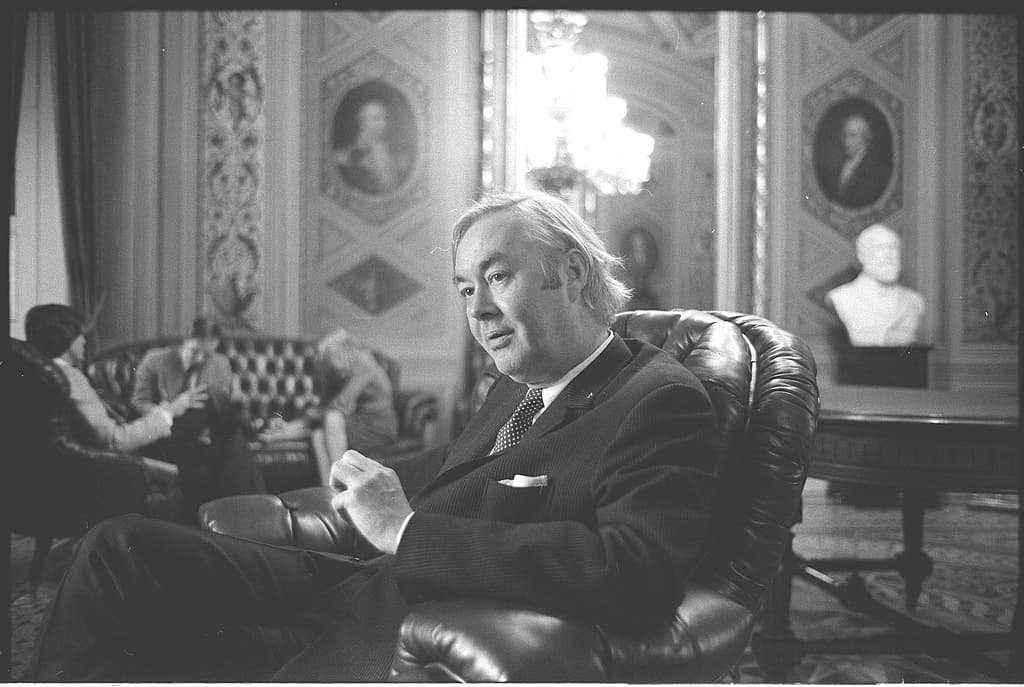New York’s Shocker for Daniel Patrick Moynihan
For the third year in a row, the Empire State receives more money from Washington than it sends to Uncle Sam.

If, as the adage goes, one is an incident, two is a coincidence, and three is a trend, then feature the news from New York. For the third year in a row, the Empire State received more money from Washington than it sent in taxes to Uncle Sam. It would have floored Senator Moynihan, who for decades lamented how the Empire State got the short end of the bargain on federal taxing and spending. He would grasp that it’s a marker of the state’s decline.
New York’s transformation to recipient of the federal government’s largesse comes at a time when the state is losing population — down nearly 900,000 residents since 2020 — and representation in Congress. The state imposes the highest tax burden in America on its residents, and its economy is lagging. It adds insult to injury for the Empire State to become, in effect, a mendicant of the federal government — to the tune of some $20 billion in fiscal 2022.
That’s the difference between what New York taxpayers sent to Washington — $361.8 billion, the state comptroller, Thomas Di Napoli, just reported — and $383 billion in spending here by the federal government. “For every tax dollar paid to Washington,” Mr. Di Napoli says, “the state received $1.06 in return.” That amounts to “a favorable per capita balance of payments of $1,076.” Yet Mr. DiNapoli warns that the federal gravy train is coming to an end.
The comptroller explains that while the city and state got an influx of federal stimulus and emergency dollars during Covid and its immediate aftermath, “we are now facing what we call a ‘fiscal cliff.’” He observes that “when funds dry up, the budget gap expands or programs must be cut.” While New York’s Democrats would be all too happy to rely on more federal aid to cover the Empire State’s profligacy, this is not viable in the long run.
Indeed, New York becoming a net recipient of federal dollars is a moment to mark Moynihan’s prescience. For decades, as he warned, high federal taxation bled New York to benefit other states, which, Moynihan noted, themselves taxed their citizens at lower rates. “The graduated income tax,” he wrote, “meant to bring about more equality among citizens,” also “brought about a huge disparity” of resources between “Federal against State and local governments.”
Moynihan, though a man of the left, was in most respects far from a doctrinaire liberal. Rather than welcoming runaway spending at Washington, he came to see the merits of giving the states more control over their tax revenue. He would have been happy with “less activism in Washington in return for more revenue at home,” he wrote, “for whatever active measures recommend themselves to the state or municipality in question.”
In 1999, near the end of Moynihan’s senate career, he put forward what the Daily News called “an intriguing idea” — to “end the New Deal.” FDR’s “alphabet soup” of agencies “have done their job,” the senator said. It was time “to shrink the federal government and let the states do more,” since “New York needs the money it has been sending to” D.C. The “city’s infrastructure is falling apart,” he said, and the upstate “industrial belt has rusted into oblivion.”
Moynihan called New York’s deficits with Washington “structural.” We’d like to think he would have been troubled by the trillions in Covid stimulus and relief spending, not only for triggering a wave of inflation, but because he was “skeptical that adding federal programs would help” New York. “Anything that grows the size of the federal government,” he warned, “will grow the deficit of New York and other such states.”
Let the states keep their money, is how the Daily News summed up Moynihan’s view. It’s no wonder his biographer, Godfrey Hodgson, called him a “prophet,” one with “an almost uncanny flair for seeing the importance of questions that had not yet come up on other people’s screens.” Moynihan decried “New Deal thinking” as “not only obsolete, but actually detrimental.” It was “Political Economy 101 — when you are in a hole, stop digging.”

